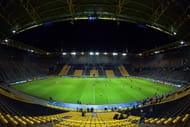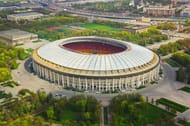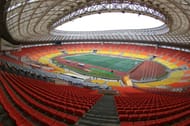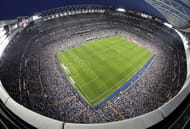We look at the biggest football stadiums in the world (by capacity) and admire these engineering and architectural marvels. Football stadiums are theatres of entertainment, passion and celebration where thousands of supporters stand witness to the most beautiful game in the world.
Also read: 20 most picturesque football stadiums in the world
20) Estádio do Maracanã – Rio de Janeiro, Brazil
Capacity: 78,838
Home Teams: Brazil National Football Team, Fluminense FC, Flamengo


The biggest stadium in South America, the Maracana Stadium was constructed in 1950 for the FIFA World Cup. It still holds the attendance record for a football match, 199,854 set during the 1950 World Cup.
The stadium has hosted matches in the 2013 FIFA Confederations Cup, the 2014 World Cup and the 2015 Copa America, and the 2016 Summer Olympics.
19) Stadio Giuseppe Meazza (San Siro) – Milan, Italy
Capacity: 80,018
Home Teams: AC Milan, Inter Milan


The Stadio Giuseppe Meazza, more commonly known as the San Siro, is the home ground of two of the biggest teams and also rivals in Italy – AC Milan and Inter Milan. It is the largest stadium in Italy, and is named after Giuseppe Meazza, a two-time World Cup winner who played for both AC Milan as well as Inter Milan. The Italian national team also occasionally utilises the stadium, whose construction began all the way back in 1925.
18) Estadio Monumental – Lima, Peru
Capacity: 80,093
Home Team: Club Universitario de Deportes


The Estadio Monumental is the largest stadium in all of South America. The venue has hosted many World Cup qualifiers, and is sometimes used by the Peruvian national team. The stadium is home to Club Universitario de Deportes, who currently stand second in the Peruvian Primera Division, the top tier of professional football in Peru.
Also read: 30 most famous football stadiums
17) Shah Alam Stadium – Shah Alam, Malaysia
Capacity: 80,372
Home Team: Selangor FA


The Shah Alam Stadium was opened in 1994, and is the home ground of Malaysian Super League side Selangor FA. The stadium also boasts a go-kart racing circuit, run by Ng Wai Leong, the champion of the Asian Formula 2000.
16) Signal Iduna Park – Dortmund, Germany
Capacity: 80,700
Home Team: Borussia Dortmund


Originally known as Westfalenstadion, this stadium is the home ground of German Bundesliga side Borussia Dortmund. It is the largest stadium in the German top-flight and was opened in 1974, but has since undergone renovations from time to time, the largest of them being undertaken in 2006 at a cost of 200m Deutsche Mark.
The Signal Iduna Park has hosted several matches of the 2006 FIFA World Cup held in Germany.
15) Luzhniki Stadium – Moscow, Russia
Capacity: 81,000
Home Team: Russia National Football Team


The Luzhniki Stadium is currently under renovation for the 2018 World Cup. The venue requires an artificial pitch due to the extreme weather in Moscow. 66 people lost their lives in the Luzhniki Stadium in 1928 during a stampede.
14) Santiago Bernabéu – Madrid, Spain
Capacity: 81,044
Home Team: Real Madrid


Another highly prestigious and famous football venue, the Santiago Bernabeu is the home ground of Real Madrid. It was named in honour of the former club chairman Santiago Bernabéu.
The stadium was inaugurated in 1947 has played host to 3 European Cup finals, one Champions League final and the 1964 European Nations Cup as well as the 1982 FIFA World Cup.
13) Stade de France – Paris, France
Capacity: 81,338
Home Team: France National Football Team


The Stade de France was the stadium in which the French national football team won the 1998 FIFA World Cup final after beating favourites Brazil. It is the only stadium in the world to have hosted both, a rugby as well as a football World Cup final match.
12) ANZ Stadium – Sydney, Australia
Capacity: 83,500
Home Team: Australia National Football Team


The ANZ Stadium, also known as Stadium Australia, and formerly known as the Telstra Stadium, was completed in 1999 to host the 2000 Summer Olympics. The stadium is home to the annual National Rugby League grand final, and also hosted the 2003 Rugby World Cup finals and the 2015 AFC Asian Cup finals.
11) Azadi Stadium – Tehran, Iran
Capacity: 84,412
Home Teams: Iran National Football Team, Esteghlal FC, Pesepolis FC


One of the most intimidating and inspiring stadiums to play in, the Azadi Stadium is home to the Iranian national football team and local clubs Persepolis FC and Esteghlal FC also call it their home.
It hosted the 1974 Asian Games and is the largest stadium in the Middle East.
10) Borg El Arab Stadium – Alexandria, Egypt
Capacity: 86,000
Home Team: Egypt National Football Team


The stadium was originally built as part of a project for Egypt’s bid to host the 2010 edition of the FIFA World Cup. The stadium was the venue for the opening cermony of the 2009 FIFA U-20 World Cup, and hosted the opening match of the tournament, played between Egypt and Trinidad and Tobago.
9) Bukit Jalil National Stadium – Kuala Lumpur, Malaysia
Capacity: 87,411
Home Team: Malaysia National Football Team


The stadium was built for the 1998 Commonwealth Games, and was the venue in which the opening ceremony was held. The Bukit Jalil is the largest stadium in all of South-East Asia. When it isn’t hosting football games, it is the site of many other events like music concerts and the figure skating shows ‘Disney on Ice’.
8) Gelora Bung Karno Stadium – Jakarta, Indonesia
Capacity: 88,306
Home Teams: Indonesia National Football Team, Persija Jakarta


One of the most unexpected names on the list, the Gelora Bung Karno stadium was built in 1962 and regularly hosts the matches of the Indonesian national team as well as other major domestic league and cup fixtures. It is also the home ground of Persija Jakarta, one of the most successful Indonesian football clubs.
Its usage is similar to the Wembley and, hence, the inclusion.
7) Wembley Stadium – London, England
Capacity: 90,000
Home Team: England National Football Team


It has been christened as the ‘Mecca of football’ for its association with history and location in the most popular football country in the world. Owned by the FA, it hosts England’s international fixtures and is also the venue for major domestic matches.
The new Wembley was opened in 2007 after bringing down the old Wembley 4 years earlier. Famous musicians and bands have performed at this stadium, which also hosted the football finals of the 2012 Summer Olympics.
6) The Rose Bowl – Pasadena, USA
Capacity: 92,542
Home Team: UCLA Bruins (American Football)


The Rose Bowl is the biggest football stadium in the United States of America. It was the venue for the 1994 FIFA World Cup final, the 1999 FIFA Women’s World Cup final, the 1984 Olympic gold medal match, and many qualifiers. The stadium was built in 1922, and is recognised as United States National Historic Landmark.
5) Soccer City – Johannesburg, South Africa
Capacity: 94,736
Home Teams: South Africa National Football Team, Kaizer Chiefs FC


The main venue for the 2010 FIFA World Cup, the FNB stadium aka Soccer City hosted the opening ceremony and the final, besides other group and knockout encounters. It underwent a major upgrade for the World Cup, and the new design resembles an African pot, hence it was nicknamed ‘The Cabalash’.
It is regularly used by the national team for its international fixtures while it also plays host to the Kaizer Chiefs playing in the Premier Soccer League.
4) Camp Nou – Barcelona, Spain
Capacity: 98,787
Home Team: FC Barcelona


The Camp Nou is perhaps one of the most famous sporting venues in the world and certainly one of the largest soccer stadiums in the world. It is home to one of the greatest and most successful football clubs in the world, FC Barcelona.
When packed with a capacity crowd, the atmosphere in the stadium is electric and spectators have watched world superstars like Johan Cruyff, Luis Figo, Lionel Messi in action here. The historic and glorious Manchester United side lifted the Champions League here in 1998-99 after a stunning turnaround in the dying moments.
3) Estadio Azteca – Mexico City, Mexico
Capacity: 104,000
Home Teams: Mexico National Football Team, Club America


The Estadio Azteca has witnessed some golden moments in football since it was opened in 1966. It has been the center of world football for 3 major tournaments including the 1968 Summer Olympics and the FIFA World Cups in 1970 and 1986.
In 1970, the ‘Game of the Century’ took place here, when Italy defeated West Germany 4-3 in the semi-finals of the 1970 World Cup. Maradona set the stage on fire in 1986 when he scored the historical ‘Hand of God’ and the ‘Goal of the Century’ in a quarterfinal match against England.
Club America also plays its home games at this stadium.
Its incredible capacity makes it the largest soccer stadium in the world.
2) Salt Lake Stadium – Kolkata, India
Capacity: 120,000
Home Teams: India National Football Team, Mohun Bagan AC, Southern Samity, Mohammedan SC, East Bengal FC, Atletico de Kolkata


Also known as the Yuva Bharati Krirangan and built in 1984, the Salt Lake Stadium in Kolkata is a multi-sports arena with football being the major sport. It is home to various Indian football clubs like East Bengal and Mohun Bagan and often hosts the national team’s fixtures.
Recently, Argentina and Venezuela played a historic friendly match at this venue, which also boasts of being the stadium where the farewell match of German legend Oliver Kahn was played.
The stadium will be given a much needed face-lift ahead of the U-17 World Cup to be held in India in 2017.
1) Rungrado May Day Stadium – Pyongyang, North Korea
Capacity: 150,000
Home team: North Korea National Team

The Rungrado May Day Stadium tops this list with a huge crowd capacity of 150,000. The stadium is usually the venue for huge shows celebrating and glorifying the country and its government, when it’s not hosting the North Korean national football team.

On a much more dark and grim note, some reports have suggested that the stadium was also the site of the execution of military officials who supposedly plotted the assassinations of state leaders and conspired against the nation.
